When you sit down and look at modern major TTRPGs, you’ll notice they often promise that as a player, you can be anything you want. Be a heart-of-gold thief, an elf baker turned warlock, a cleric who is secretly evil, a gnome fighter in a kilt who’s tougher than an ogre, and so on. The selling point is variety, the overarching concept being that a ttrpg is this massive sandbox where theme and genre are a buffet to be sampled from. There’s nothing wrong with that of course, but recently I’ve found myself drawn to the indie ttrpg scene for more specific tastes. Games that are built around a theme or a mood, a system that is built for a specific experience and tries to give the player a particular flavor to walk away from the table with.
Take Hunt, for example. In a small book with less than 60 pages, it throws you face first into a world of shattered knights and deep curses, where the world feels like it's falling apart and you and your friends are doomed to struggle against the dying of the light despite all your circumstances. Even if you win, your characters might lose. It’s a game of entropy and triumph and decay and a deep, tragic melancholy.
And because of that, Hunt is awesome.
Knights Of The Cursed Table
One thing that the book does with stark graphic design and evocative phrases is throw you into a world that feels like it's already collapsing. It’s done so cleanly that it actually feels jarring. In some of the biggest ttrpgs on the market, the world is often described as a place of ruins and unexplored wonders, ready for you to rush out and go reclaim. In Hunt, the quickest way to describe its mood is thinking about how you feel walking around a Dark Souls game: Ruin has come to the places you wander. The struggle feels larger than you, like the world itself has begun to collapse. The fire is going out, and it is all you can do to keep a small flame lit.
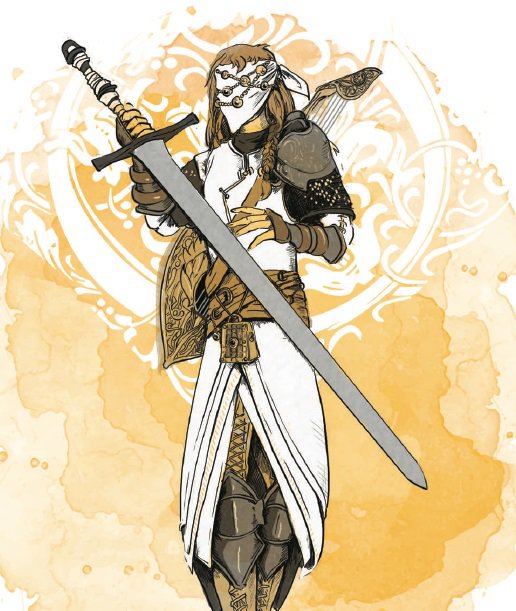
The knight of echoes is pledged to always commune with the world around them, slowly going mad as they lose their own identity.
As per the rulebook, you all play knights of what used to be a bastion of hope in a cruel world. Many flocked to join the order, to join its noble cause. Now however, in a line directly from the first pages of the book, “The blood of a great beast has not been fed to the soil in the courtyard for over 5 years. Something must be done”.
That’s it, in a nutshell - you are some of the last knights of an order that had once been a beacon of hope. It’s up to you to go out into the world, find a massive monster, and crush it. Heck, they even give you what is essentially a legendary item right out of the gate that says ‘this can kill any normal creature in the forest’.
Easy, right?
Character Creation - Finding Joy In Playing The Doomed
The two things you will notice immediately about Hunt is how A - there are no dice and B - the tone that absolutely bleeds off its pages. What I found fascinating in the games that I ran is how the choice for no dice leaves so much up to player agency… and how many players will lean into the setting, purposefully damning their characters.
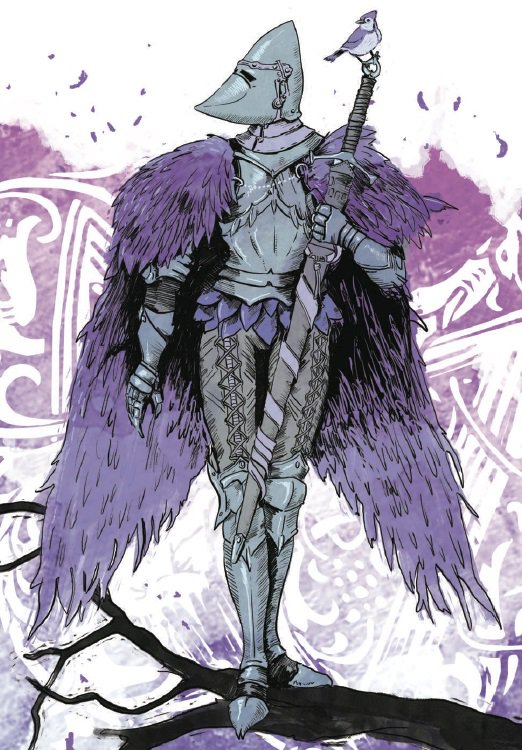
The oath of sky lets you leap from treetop to treetop, heavy armor be damned. Of course, there's always a cost...
Let's start with the pacing. Hunt is meant to be played in one session (more on that later), with there being three ‘scenes’, or acts, and then a final confrontation with the giant beast you are searching for. For the three scenes, you roll no dice and use no grid; the example scenes in the book give a semblance of wandering deeper into a forest, out of the known areas near your fortress, into the deeper woods, and then finding something horrific near a source of corruption or the monster itself. It’s all very evocative and vague to let your group collaborate and build a shared idea of what this world looks like, and how it’s fallen.
First though, you have to build your knight! There are four oaths in the book, each beautifully written to give a sense of duty, honor, power, and ultimately unease. I think this excerpt from the Oath of Sky says it best:
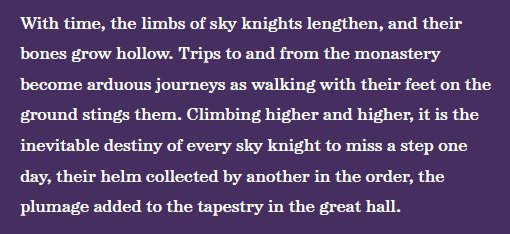
Even in character creation, there is this sense of finality, of death, pre-baked into your concept. An oath gives you two abilities, one for use during your adventures up until the beast, and then a power to use against the monster itself. Using the Sky Knight as an example, they essentially get Spider-Sense, always recognizing danger and can react to it. Then, during the boss fight at the end of the session, they get the ability to essentially vanish from the board, leaping up into the air like a dragoon from Final Fantasy.
Next comes the weapons. There are five in the book, each with a basic title, and each player chooses one: The Sword, The Shield, The Scroll, The Sling, and The Spear. There’s a catch however, because these are legendary artifacts, ones that were put into the vault of the order decades or centuries ago, meant to never be used again thanks to their high price.
I think my favorite example is The Shield. It has a power that, if put into a dice based combat ttrpg, would be fundamentally broken: it protects you against damage, full stop. Nothing can hurt you. Except… when you first pick it up and then every time its power is invoked, you must give a memory of who you are away. You can use it to instantly kill a mundane creature like a wolf or bandit, but it fills you with anger and hate, meaning you have to clean the blood off of it to try and calm down and not have the forest itself react with rage to your presence.
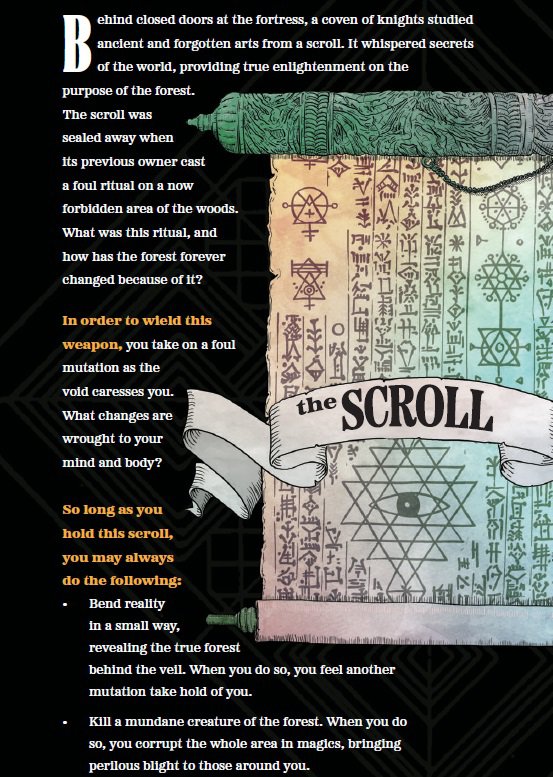
I love how you are given so much power but it comes at such great cost. Because of that, Hunt creates fundamentally very different challenges for its players.
When you choose your weapon, there is a lot of power given to the player. It is up to them to decide the actual origin of the blade, and what they choose to give up for the right to wield it. The sling asks for something to be made into ammunition.. And you choose anything from ‘the knucklebones on my right pinky finger’, to ‘my concept of mercy’. Leading off of that, it is up to the players (along with the gamemaster, if they like) to come up with the fortress itself, and the order. What does it stand for? Why is it in ruin? Why did you become knights to begin with, are you already comrades or first time really working together?
There is a lot of fun possible in collective worldbuilding. While Hunt is designed to be a one-session game, I might suggest that depending on your player group, you might want to take an hour before your actual game session, whether online or in person, to have a ‘session zero’, where you build the world and your knights ahead of time. It’ll give the gamemaster time to sort of set up the session to really fit what the players collectively dream up. Conversely, you can let the gamemaster come up with the setting ahead of time and the order itself, and let the players just make their knights and weapons within that framework. After running several sessions, that would be my suggestion, and it really depends on your players.
Playing The Game - The Power Of Player Agency
Speaking of players, this is a game where they are given wild amounts of power. Literally every weapon just states “They can kill a mundane creature of the forest, but”. They are also given 5 points in three different ‘approaches’ that they can spend to solve the challenges in those scenes mentioned before. These are powerful but limited resources as you traverse the wilds, giving you epic moments but bringing you closer to tragedy. The game of Hunt isn’t so much about finding ways to win, but figuring out what resources you use up and what sacrifices you choose to make.
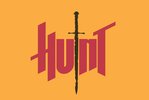 Hunt
Hunt
Author: Spencer Campbell
Designer: Gila RPGs
Number of Players: 3-5 players (1 as GM)
Price: $25 for book, $10 for PDF
Review Copy: This game was reviewed with a copy bought at a discount from the publisher.
Maybe you are attacked by a bunch of starving hyenas or bears; you could fight them, but when The Sword says when you kill something with it, “a small part of you, or a large part of a party member, slices cleanly away”, maybe you don’t want to go full berserk. Each party member uses a ‘haste’ approach, and attempts to run away, maybe followed up by a ‘guile’ to show how they hide. It saves your team a struggle and the steep cost of using epic weapons.
But what if you’ve used up your approaches? What if you choose to just take damage or let the forest grow darker by avoiding too many fights? Maybe your team backs itself into the corner, and having no approaches left, has no choice but to fight using your cursed weapons.
In one of my games, I put up a hedge maze that was too tall to fly over properly, cursed wolves catching up to them. The player with the sword used its power to carve a hole through each layer, until the other players realized they were nearly out of fingers and toes to sacrifice to the large swings. In another, there was a storm of ghostly that whirled like a moat around a haunted mages’ ruin. They didn’t want to wait to get around and waste more time, so they all grabbed onto The Shield. When I asked my shield-wielding player what memory they would give up this time, he simply said “the sound of my mother’s voice”.
I cannot express to you enough how amazing it was seeing how much fun my players had in slowly watching their characters break down. By the time the actual fight against the boss happens, you can have characters be complete husks of who they had once been, ready to throw themselves at a monster, willing to die for a noble cause. In traditional ttrpgs I’ve run, people pray as they roll the death saving dice, coming up with elaborate plans as how to save themselves. Here, I had players describing how they leave themselves open to attack as they put all their strength into one last spear thrust.
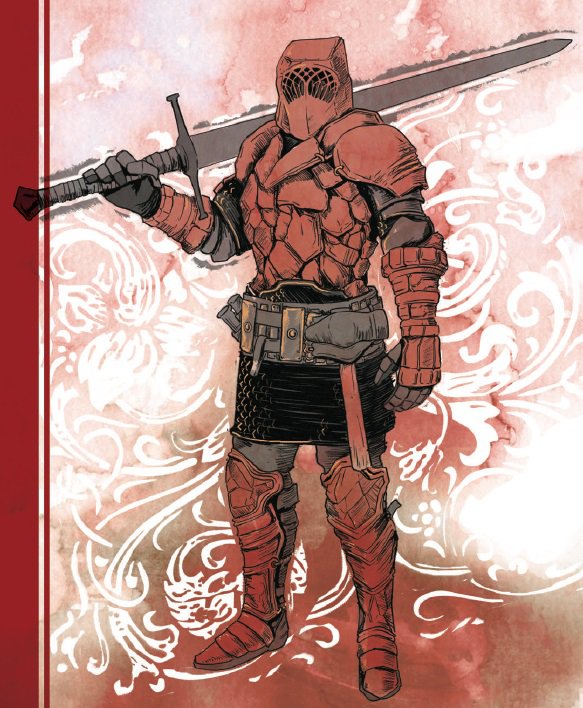
The oath of stone a knight swears to gives them great power, but that power means that one day their petrified body will be added to the walls of the fortress they protect.
Finally, the deed is done, and you tell the epilogue. If you fail, your players describe what happens next to the region as it crumbles into ruin, able to go into detail about the final moments of their character or the order itself. If you win… well, that’s the fun part. Does the order rebuild? Do the weapons return to where they were sealed away?
This moment, this epilogue, is where Hunt can be at its best. In the games I ran, the players won every time. Only one player was killed outright during the final fight, but I had multiple players who had their characters pass on after the fighting was done. The Shield carrier I described before, a Knight of Echoes, they explained how their character had no memories now of before becoming a knight. They didn’t even remember their own name, becoming nearly an automaton of the fortress and trying to recruit others, rebuilding the walls without knowing why. Another player, someone who picked up The Scroll, had mutated so many times that they became a feathered, practically Tzeentch-like monster who cackled madly, wandering the woods, a new beast the order would have to fight in the years to come.
I think one of the great successes and revelations that Hunt can give a ttrpg group is that players don’t always want to just win; they want to have a good story, even if that means they lose.
The Downsides - The Fuzzy Edges Of A Game Built On Vibes
If it hasn’t already been obvious, I adore this game. It has a tone I absolutely love, and I have joked with some friends that if you love Bloodborne or any Fromsoft game, Hunt would immediately appeal to them. However, there are some parts of the game system that might turn off particular players or mean it isn’t a good fit for what you are looking for.
The first and possibly the biggest flaw is how Hunt can often feel like two games instead of one. The games I played were at my weekly game night in a board game cafe. Each game was played over 3-4 hours from start to finish, and after an unsure start about how to play and getting used to playing without dice, people really seemed to appreciate Hunt’s theater of the mind approach to conflict and combat. They really got into the groove, embellishing their descriptions of actions more and more…
…until the final combat began, and I pulled out the grid.
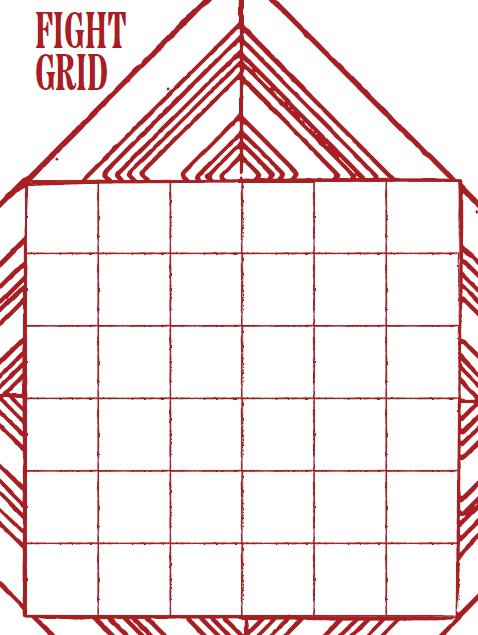
The combat itself is simple but effective. Players have 8 hit points, and they get a set of actions based on their weapon and oath. There are fun combinations where you can defend whoever has The Sword, who then takes all the damage they’ve taken and uses it to deal massive blows. The beasts feel properly horrifying, and you choose their size and attacks based on how many players started the game.
But it is a jarring, strange transition. My players, after spending hours getting into a more creative, loose, conversational tone for playing this game, felt as if they were playing another game entirely for the last ten-to-twenty minutes of the adventure. The cherry on top is that I’m not sure exactly how to fix this. You want the big showdown, the great confrontation, but it feels so very different to so much of the game’s style up until that point.
My second largest complaint is a mechanic that I like the concept of, but feel like doesn’t fully gel. It’s implied the weapons have some sort of sentience, and want ‘worthy’ people to wield them. As an example, The Shield asks three things of you: To protect yourself at the cost of others, to strike back at the forest through destruction, and to test the mettle of a fellow knight. I get the first two, and really enjoy the play on selfish protection, but testing the mettle of your other knights? It feels off to me, as you are all supposed to be working together for a goal in dire circumstances. In the games I ran, it felt too strange to try and set up a confrontation for each player with another player in a game that is supposed to be a one-shot game.
The weapons challenging you feels like a great concept, but it just feels too forced in a game that is supposed to be run in just a few hours. There’s even a mechanic in the game where if you don’t pass any of your weapon’s tests, your soul is forfeit, absorbed by the weapon, and only passing one means the final boss gets stronger. I really enjoy what it is going for with some of the challenges, but it just feels like too much happening for a game that’s supposed to be run quickly.
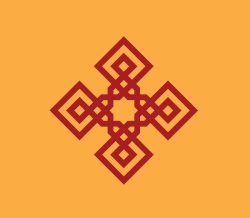
Finally, I just want to reiterate that this is a diceless game, one that promotes and expects players to really get into the storytelling and roleplaying aspects. I’ve played D&D games where some of my players are there for crunchy combat with a taste of roleplaying sprinkled in, and vice versa. This is a game for those who really like to roleplay, who like to build a character idea and see it go through a story arc of triumph or tragedy, maybe both. If you play a ttrpg for crunchy mechanical combat, this one isn’t for you.
Hunt Is A Glorious Triumph Of Condensed Storytelling
I know I just spent a page typing out all the possible negatives of Hunt. However, it’s done from a place of appreciation; if this is your first foray into diceless RPGs and are coming from a more traditional ttrpg space like D&D or Pathfinder, this game is going to feel a bit alien. It is going to take some getting used to, and that is absolutely okay. As the gamemaster for the sessions I ran, it took some getting used to on my end as well, giving up more direct control, letting my players suddenly just choose to succeed using overpowered artifacts and knightly powers. It felt more intense, more collaborative, embellishing their triumphs and their self inflicted losses.
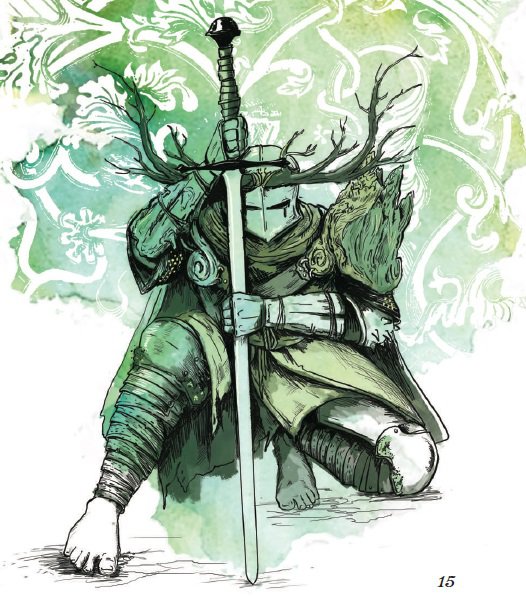
The oath of wood means you dedicate yourself to the forest you protect, writing down great histories of all the animals and plants until one day, they too become part of the forest.
I love this game. I love what it attempts, and I adore the stories I’ve already gotten to tell with it. A Sky Knight with The Spear, already old and brittle, sacrificing herself for the cause against the final monster, making the other players swear to place The Spear back in the great oak of the woods to heal it. A knight with the Oath of the Woods wielding The Shield who had forgotten who they were from blocking so much damage. They had saved the day, but never returned to the order, instead stalking the woods hunting for monsters, spontaneously saving travellers before vanishing again.
Hunt is special because of how it gives you a power fantasy and a curse at the same time. You can feel like Beowulf going off to fight a dragon: yes, you will surely die, but you do this to uphold honor, to try and preserve a noble cause.
The final reason why I can wholeheartedly recommend Hunt for your shelf is practicality: the price is right. This is a game that’s only $25 for the physical book, and $10 for the PDF. Spencer Campbell has stuffed so much flavor into just sixty pages it’s hard not to recommend, even if you only play it once to see if you like this sort of game or not. As an added bonus, Gila RPG as a company has a bunch of smaller ttrpgs like Hunt available, each with their own particular flavor and mood that cuts deep. I highly suggest checking out their catalog to see if any of their games ring a chord with you.
As I head back to PAX Unplugged this week, I’m hoping to pick up the small expansion, Pox, which adds more oaths and weapons and disease and decay, to see what happens when you take this concept and expand on it. Hunt got its hooks in me, and I think for a lot of you out there who just love a good story, it’ll get its hooks in you too.